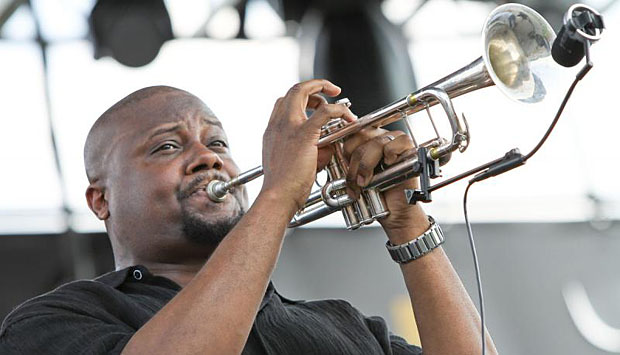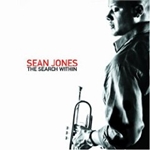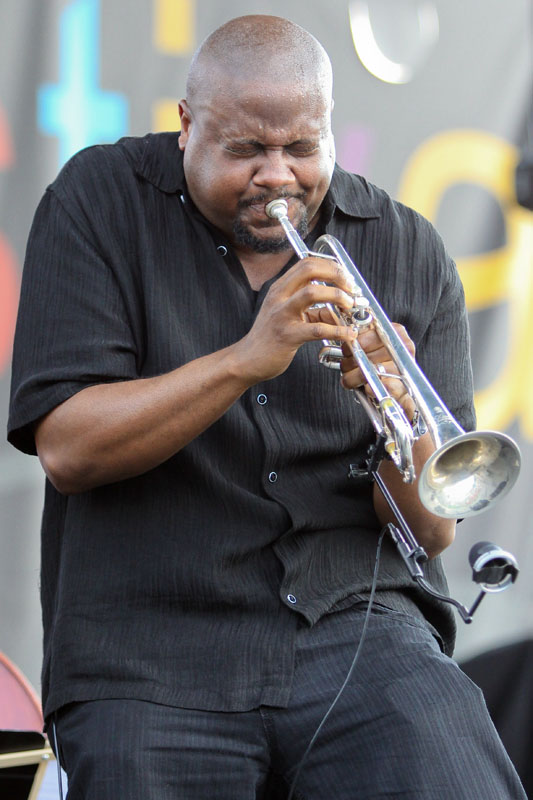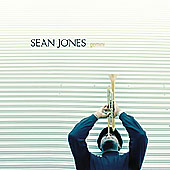Home » Jazz Articles » Interview » Sean Jones: Progress and Passion
Sean Jones: Progress and Passion

The progression of the art form comes with people being allowed to be themselves in their rawest form, with no compromise. If we can't be ourselves fully, then what we're putting out is a lie.
Jones was the lead trumpeter with Jazz at Lincoln Center for about five years, but left early this year in order to go more his own way. He also lives in Pittsburgh now, rather than New York City, so he can help bolster jazz in a smaller but significant American city. And he released a new recording this year, carefully developed to both chart his career progress and deal with a theme that inspired his new compositions: love.
He's been documenting his progress on Mack Avenue Records, which is the home for each of his albums including No Need For Words (2011). In the topsy-turvy state of today's recording business, it's unusual for a young artist—Jones is 33—to stay in one place. It speaks to the strength of his musicianship and his playing.
Meanwhile, Jones took time this summer to tour with a Miles Davis Tribute Band involving Herbie Hancock, Wayne Shorter and Marcus Miller. At the North Sea Jazz Festival in Rotterdam, The Netherlands, Jones was up to the task of the vital trumpet role, weaving strong, aggressive trumpet lines throughout improvisations with the Davis alumni greats.
But Jones is fond of the band he's been working with for some time, which includes pianist Orrin Evans, drummer Obed Calvaire, bassist Luques Curtis and saxophonist Brian Hogans. He's greatly pleased with the cohesive sound of the unit and the way Evans and Hogans, in particular, play such key roles in its sound.
No Need For Words is strong. "Look and See" is a driving tune. Evans has a great feel over the hip rhythm section, and Jones is buoyant and bright. Hogans is equal to the task, charging ahead through the swinging tune. "Momma" is for the type of mother-son love, Evans' pensive opening giving way to a loping melody—carried softly, but not maudlin. Evans is elegant in his improvisations, clear and articulate and tasteful, while Jones blows majestically in his solo. Jones muted horn is sensual on the aptly titled "No Need for Words," which expresses the feelings that need no verbal communication.
"Obsession (Cloud Nine)" is Hogans' contribution, a strong motif with shifting rhythms with that allows both horn players to explore the harmony. "Love's Fury" is more tempestuous, depicting when the line between love and anger can be blurred. It's followed by "Forgiveness (Release)," which hopefully follows any relationship fury. The gospel-tinged tune employs Jones rich trumpet sound, emotional but not melancholy, with the band hitting the emotional release at the song's end.
This is a trumpet player of considerable talents and one who wants to continue to grow, continue to offer music that is changing, yet grounded in jazz.
 All About Jazz: This is your sixth CD?
All About Jazz: This is your sixth CD? Sean Jones: Yeah. For Mack Avenue Records. Still on the label. Still a good relationship and I'm happy about it.
It's ultimately a reflection of the label. When they commit to an artist, unless they do something derogatory or something that won't allow the relationship to continue, they're behind you. They've been behind me from the beginning. When they signed me, they believed in me. They believed in my musical vision. They're committed to that. The bottom line, the almighty dollar, hasn't been at the forefront every single time. It's been great. They believe in me. I keep giving them product to sell that's been good. They celebrate who I am and I've been very fortunate.
AAJ: These are all love songs.
SJ: When I was doing The Search Within (Mack Avenue, 2009), I decided I was going to dive into who Sean is. I started to do that with the album Roots (Mack Avenue, 2006). That was about visiting my upbringing, going back to my roots in gospel music as a child. I left that idea for a bit to do something different. I wanted to do a play list of a few young vocalists that I thought were really talented [Kaleidoscope (Mack Avenue, 2007)]
I've always tried to do albums that are different. I didn't want my music to sound like every other jazz CD that's out there. That was Kaleidoscope. The Search Within, I really tried to dive into who I was. What that means. From a compositional standpoint and artistic standpoint. Who the man is. My beliefs. My views. My feelings. And just put them out there.
No Need for Words is a continuation of that. I wanted to do as love songs album. I've always thought about love. I've always believed in love and how it sort of is the gasoline or the fuel that makes humanity progress, along with imagination. And I wanted to visit as many aspects of love as I possibly could on a CD. Or at least those that resonated most with me. I didn't want to just put out a ballads record. That's been done. I talk about love in regard to certain romantic relationships, but I wanted to deal with love in a broader scope. That's what No Need for Words is.
AAJ: It has a lot of different textures to it.
SJ: Exactly. I wanted each song to stand on its own and have a different feeling. Also, with the listener nowadays, for people to listen to a record front to back you better have a lot of different things, a lot of different energies, a lot of different vibes on it. I think that keeps people's attention. So I try to take all my musical experiences and what's in my head and use those devices to portray a mood. Hopefully allowing the listener to go on a journey, with each song, into what that theme is.

AAJ: That was the focus of the album?
SJ: That was definitely the focus of the album. Eight different aspects of love. And I wanted to create a mood or energy for each one of those different viewpoints, so they stand alone while bringing together, or tying together, the overall arching theme of love.
AAJ: You feel you achieved that pretty good with this band?
SJ: Definitely. This band has been with me since Roots, with the exception of Tia Fuller. Orrin Evans on piano, Obed Calvaire on drums, Luques Curtis on bass. I feel like I have one of the best rhythm sections in jazz music today. They're diverse. They're flexible. They listen to one another. They have created a sound that is very unique and I really dig that platform to improvise over.
The addition of Brian Hogans on saxophone, that started with Kaleidoscope. He's not only brought a certain type of dynamic to the front line which is unique, he's brought some amazing compositions in as well.
AAJ: I thought the rapport between you two was particularly good on the album.
SJ: It's amazing. If I can make a correlation, I sort of think of him as my Wayne Shorter. Of course I'm not Miles Davis. (Chuckles). No one could ever be Miles Davis. But the way that Wayne Shorter was to Miles Davis is the way Brian Hogans is to me. He brings so much to the table from a composition standpoint and a frontline standpoint that I really think the band dynamic would change drastically if he was not there.
AAJ: Orrin Evans sounds fine as ever.
SJ: Orrin's been in the band since the beginning. He's going to be there. I love Orrin as an artist. He's become, over the years, a good friend. We didn't start working together as friends. I didn't know him at all. In fact the first two albums I did we barely knew each other. But we've grown together in so many ways over the years that we just kind of know what we're thinking. If there's a certain chord I can't think of, he knows exactly what it is. In fact, sometimes I bring in tunes and I won't put in a chord and he'll just fill it. Because he knows what I mean.
AAJ: You reminded me when you were talking about your albums. It's a little unusual today. To use Miles as an example again, every album he did along the way showed a certain progression. That was intentional by the record company. Other musicians too. That's not the motivation today, but you seem to be doing that. Each one shows where you are and where you're going.
SJ: That speaks to two things. The label, number one, really believes in me. They believe in the progression of me as an artist. A lot of record labels out there are just trying to make sure the bottom line is there. They want to get the artist out there, have them do their thing, go on tour, produce revenue, sell CDs X, Y and Z so their bottom line is there. Which I understand. But at the end of the day, does it really progress the art form.
 I think the progression of the art form comes with people being allowed to be themselves in their rawest form, with no compromise. If we can't be ourselves fully, then what we're putting out is a lie. Or a half-version of ourselves. Which I think ultimately people can feel. With me, I'm willing to take that risk. Risk getting a bad review. Risk not being at the forefront. Because I know in the end, my body of work is going to show a progression of who Sean Jones is in its most honest form. What I'm hearing, what I believe and what I have to say.
I think the progression of the art form comes with people being allowed to be themselves in their rawest form, with no compromise. If we can't be ourselves fully, then what we're putting out is a lie. Or a half-version of ourselves. Which I think ultimately people can feel. With me, I'm willing to take that risk. Risk getting a bad review. Risk not being at the forefront. Because I know in the end, my body of work is going to show a progression of who Sean Jones is in its most honest form. What I'm hearing, what I believe and what I have to say.Some people may think that's egotistical, but I think people want to hear you be yourself. They want to hear your honesty. They want to understand what's in you. I don't think it's ego at all. I think I'm trying to be honest with the listener and say "Hey, this is me."
AAJ: Does this also mark a move in your career now? I know you left Jazz at Lincoln Center.
SJ: It's time for me to not necessarily be a sideman as much anymore. I've done a lot of sideman work in the past. I do some sideman work with Marcus Miller, but it's more in a feature format. I'm featured prominently in the band. I think it's time for me to get out there and do what I need to do to put a stamp on the music from a solo prospective, as well as what I can do for various projects I'm working on.
I have two big bands. I have the Pittsburgh Jazz Orchestra and I have the Cleveland Jazz Orchestra and I believe that jazz music, being America's indigenous art form, should be celebrated in an orchestral format, which is the big band. So I'm doing those two projects, I'm still teaching, and I'm recording and touring. I like the fact that my career is diverse. I can do all of those things and make an impact.
 AAJ: Your playing is so strong, your chops. Is the instrument still unforgiving at times, or are you able to tame it more? It demands a lot but your playing is so strong.
AAJ: Your playing is so strong, your chops. Is the instrument still unforgiving at times, or are you able to tame it more? It demands a lot but your playing is so strong. SJ: I think my pedagogical approach has become pretty solid. The issues I may have encountered with the trumpet years ago—I wouldn't say they are non-issues, but I'm able to address them a little easier now. The horn isn't necessarily a problem anymore. At the end of the day what I had to do is realize that all of the lessons I internalized in college and in my studies, I had to bring them together and make them mean something to me. I had to create the Sean Jones method of playing, versus the Arban method of playing or the Alan Vizzuti method of playing or any of those great trumpet pedagogues. I had to take those great philosophies and roll them together and put my spin on it and create Sean Jones' way of playing. Ultimately, I think that served me well.
AAJ: You don't live in New York City anymore.
SJ: No, I live in Pittsburgh. I love New York, but I think New York will be just fine without me. I wanted to go to a community that I felt had a vibrant jazz scene and I wanted to be able to contribute to that. I think it's important to get some of that New York energy, some of that New York verve, but bring it back to the rest of the country. There are some places in the country where you just don't see a lot of jazz anymore. You don't see it out in the Midwest or the mountain regions or any of that. As we all know, in the '20s and '30s there were regional bands. Jazz was vibrant all over the country people were swinging. Partially because it was the music of the day. But also because everybody wasn't trying to get to New York right away.
Nowadays there's a big push to go to New York because that's where it is and everybody wants to play with the great jazz network or be a star or whatever. That's good, but at the end of the day when I felt I got what I needed to get from New York, the experiences I needed, I wanted to bring that back to my community and develop jazz in my community a little bit better. That's one of the things I'm trying to do with the jazz orchestra. I'm working on creating an alliance of jazz orchestras around the country.
That's one of the ideas I have. Over the next couple of years I'm going to begin working on trying to get a network of jazz orchestras together. So there's a database of music, a database of resources to raise money. How to become a non-profit. How to raise funds for your organization, etc. So that America can celebrate its indigenous music in an orchestral format in every major city. Instead of celebrating a type of music that's not ours and dumping money into that. Let's dump money into our own identity and celebrate our own culture.
AAJ: Are you happy with the state of jazz in general right now?
 SJ: Yeah. I think it's great. As far as the musicians go, I think there are a lot of great young musicians putting out great records. There's a lot of personality out there and we're all getting along. As far as I know there isn't any major beef between guys. We all work together. We're each other's sidemen. As far as the musicians go, I think it's pretty vibrant.
SJ: Yeah. I think it's great. As far as the musicians go, I think there are a lot of great young musicians putting out great records. There's a lot of personality out there and we're all getting along. As far as I know there isn't any major beef between guys. We all work together. We're each other's sidemen. As far as the musicians go, I think it's pretty vibrant.I think some record labels could potentially help, or allow musicians to be who they are. That part of it is a little worrisome. But record labels have to do what they have to do to survive. But if there was more support for the artist and the art form from the higher ups, that would be great. But the music scene in general is alive and well.
Not just the record labels, but a lot of these festivals hire the same people every year. You might see a couple new artists. But a lot of the festivals give huge dollars to the main artists and they don't want to pay developing artists hardly anything. The performance venues, in order to get people in the seats, have to support the emerging artists as much as they do the established artists.
AAJ: Some do support new acts, but a lot don't.
SJ: Yeah, there's a few that do. But not the vast majority.
AAJ::Are you touring with this new music?
SJ: I just finished (July) a little tour with the band and I'm on the road this summer with the Miles Davis Tribute Band with Herbie Hancock and Marcus Miller. We're doing all the European festivals this summer.
AAJ: How did that come about?

SJ: I've been working with Marcus for the last year and a half. We were doing the Tutu Revisited music. Somewhere around that time, Marcus got the idea to do a Miles Davis tribute band with some alumni. It's the 20th anniversary of Miles Davis' death. So they got together the band. Herbie Hancock agreed to do it. Wayne Shorter agreed to do it. They needed a trumpet player. They all pow-wowed and I was the guy they chose.
It's kind of funny. They probably chose me because I sound the least like Miles of any of the young trumpet players (laughs). I don't know if that's a compliment or not. [chuckles]. We're doing material from the beginning to the end, all the different periods. During rehearsal Herbie brought in the complete Columbia recordings of Miles Davis and we went through all of them, [chuckles] trying to figure out what we could do. We came up with a pretty good repertoire. I'm excited.
AAJ: Any other projects?
SJ: I'm thinking of another project I might record in the late fall. I've been doing a lot of reading on metaphysics and how god and science coincide. How all things are related and all things flow in and out of each other. I've been thinking about a lot of that stuff. So there's some music that's been coming in my head from that. There are some things on the horizon. Life is great. I can't complain.
Selected Discography
Sean Jones, No Need for Words (Mack Avenue, 2011)
Sean Jones, The Search Within (Mack Avenue, 2009)
Sean Jones, Kaleidoscope (Mack Avenue, 2007)
Tia Fuller, Healing Space (Mack Avenue, 2007)
Sean Jones, Roots (Mack Avenue, 2006)
Sean Jones, Gemini (Mack Avenue, 2005)
Gerald Wilson, In My Time (Mack Avenue, 2005)
Ron Blake, Sonic Tonic (Mack Avenue, 2005)
Sean Jones, Eternal Journey (Mack Avenue, 2004)
Photo Credits
Page 1-3: Everett R. Davis
Page 4: Maketta Wilcoxson
Comments
Tags
Sean Jones
Interview
R.J. DeLuke
DL Media
United States
Miles Davis
Herbie Hancock
Wayne Shorter
Marcus Miller
Orrin Evans
Obed Calvaire
Luques Curtis
Brian Hogans
Tia Fuller
Concerts
Jun
14
Fri
Jun
14
Fri
For the Love of Jazz
 All About Jazz has been a pillar of jazz since 1995, championing it as an art form and, more importantly, supporting the musicians who create it. Our enduring commitment has made "AAJ" one of the most culturally important websites of its kind, read by hundreds of thousands of fans, musicians and industry figures every month.
All About Jazz has been a pillar of jazz since 1995, championing it as an art form and, more importantly, supporting the musicians who create it. Our enduring commitment has made "AAJ" one of the most culturally important websites of its kind, read by hundreds of thousands of fans, musicians and industry figures every month.






















